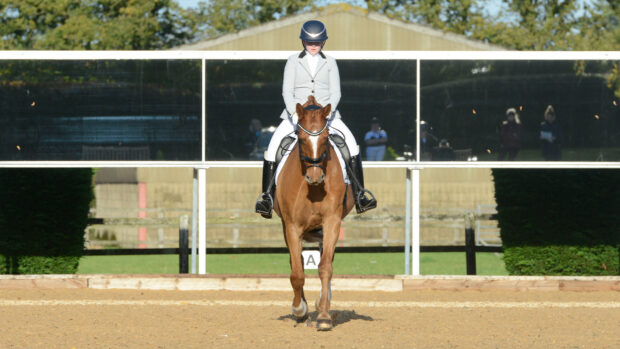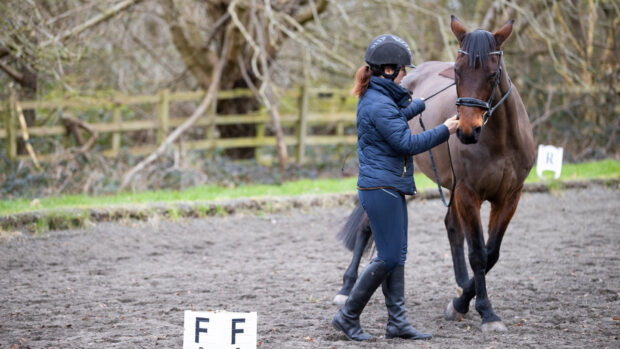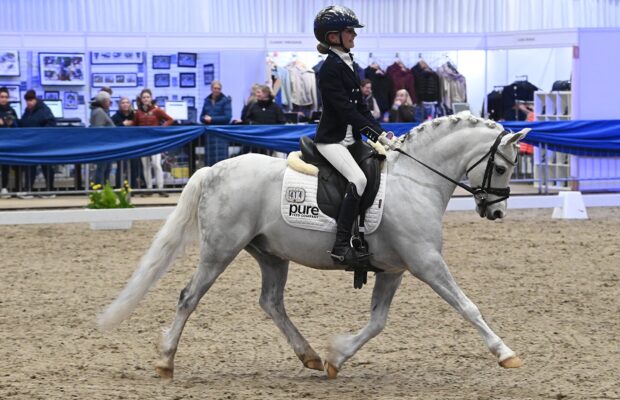When watching top dressage riders perform, it can be easy to feel that you and your horse are somewhat detached from the glittering world of grand prix dressage.
But, as demonstrated by international grand prix rider and trainer Anna Ross in her lively masterclass at last weekend’s Hartpury Festival of Dressage, every rider can start to apply grand prix principles to their horse, no matter what their age or level.
1. Identify your ‘model’
Anna uses two of her horses to demonstrate the different “models” and the variation in how they need to be ridden. The first, the hot, expressive eight-year-old Ampere mare Habouche (Holly, pictured top), is currently competing at advanced medium, and ridden by Beth Bainbridge, while Anna piloted the more laid-back 11-year-old gelding Delgado (pictured below), who is on the cusp of grand prix.
“Consider your own personality when looking for a horse, and deciding whether to buy crazy or lazy,” Anna advises. “If you’re a bit crazy, get a lazy one, like Delgado, but if you’re more a calm, placid person, you could consider a slightly more crazy one, like Holly.”
2. Learn to adapt your riding to your horse
She goes on to explain the basic difference in how to approach riding these two models of horse up the levels.
“If you have a lazy one, you need to learn to ride with your legs off, so they react when you put them on,” Anna points out. “You must be quick with your aids — all horses are sensitive and feel everything. It’s not about how hard I use my legs on Delgado — if there’s a fly on his side he’ll feel it so you don’t have to kick and flap,” she adds, showing how she “buzzes” her legs on him and gets a quicker reaction than using one hard push.
“But Beth must ride Holly with her legs kept on, and used more subtly — if you breathe on her side she’ll react.”

3. Develop the gears
Anna explains that a good horse is not about jaw-dropping movement, but more to do with adjustability.
“Dressage horses don’t have to be unbelievable movers, but they do have to have gears — to able to go slowly but keep moving their legs,” she says. “A horse that can shorten is worth its weight in gold.
“At grand prix you need the horse to be electric for piaffe and passage, but then it must be able to switch off and be relaxed in walk. You have to be able to turn it on and off, and this is why it’s the transitions that are the hardest thing about grand prix.”
Article continues below…
You might also be interested in:

6 tips to help your horse produce a ‘wow’ trot

Subscribe to Horse & Hound magazine today – and enjoy unlimited website access all year round
4. Keep the grand prix training in mind
Anna goes on to give a few suggestions of specific exercises riders can incorporate into their schooling with horses of any level, to help develop the responsiveness and adjustability required for work at the higher levels.
“I used to look at grand prix horses and think, ‘What’s that got to do with me?’ But what you do on your four-year-old or novice horse at home can correspond to grand prix — see how many strides you get into the long side, and then adjust it. Practise transitions: such as sending them forward, and then walking.
“A really good way to balance the horse in canter is ride walk to canter transitions. Canter is difficult to change once you’re in it — one reason to buy a horse with a good canter as it’s a harder pace to improve than the trot — so make sure you start with a good transition.
“We can’t all be Charlotte Dujardin, but we can all teach our horses this.”
For all the latest equestrian news and reports, don’t miss Horse & Hound magazine, out every Thursday




